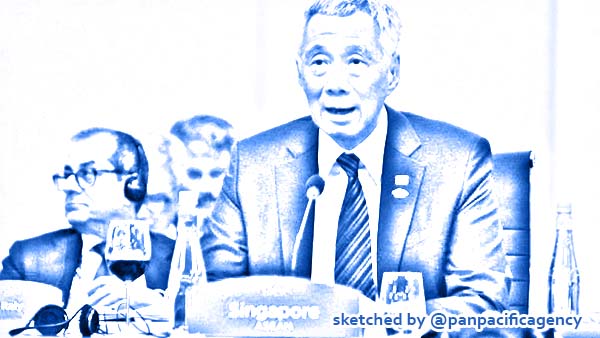‘Jobs will disappear’ as coronavirus speeds up digital disruption: Singapore PM to nation

Singapore’s Prime Minister Lee Hsien Loong. HO/AFP/G20 PRESS OFFICE. Sketched by the Pan Pacific Agency.
SINGAPORE, Apr 30, 2020, SCMP. Singapore’s Prime Minister Lee Hsien Loong on Thursday said the city state must brace itself for lasting structural changes to its service-oriented economy in the aftermath of the coronavirus pandemic, with some jobs likely to go extinct due to the rise of remote work and digitalisation, South China Morning Post reported.
In the short term, employers and employees must meet halfway to stem bloodletting in the labour market as Singapore “feels the full brunt” of the ongoing global economic slowdown, Lee said in his annual Labour Day address.
The annual speech – a marquee political event in the country – for the first time in six decades was delivered via a live-stream.
It is tradition for the prime minister to address the country’s labour movement on May 1 in a live rally organised by the National Trades Union Congress, an umbrella body affiliated with the ruling People’s Action Party (PAP).
In his 16-minute address, Lee said while the government had so far spent some S$60 billion (US$42.5 billion) to “save jobs, reduce costs for companies and tide Singaporeans over this crisis”, many workers were likely to still see pay cuts.
“But I encourage both employers and workers to take a longer-term view,” Lee said. “Workers must accept wage sacrifices to keep businesses going. And employers must make every effort to keep their workers, and help them through this difficult period. They should not drop workers at the first sign of trouble.”
That way, Lee said workers will “remember and return the kindness” to help businesses survive while companies will be better placed to rebuild when the economy picks up.
In the longer term, the pandemic is likely to spur permanent disruption to some industries, Lee said.
“Significant structural changes to our economy are likely. Some industries will be disrupted permanently. Companies will have to change their business models to survive. Some jobs will simply disappear,” he said. “Workers in these industries will have to re-skill themselves, to take up jobs in new sectors.”
He referred to how people were now more comfortable with telecommuting and buying things online in the midst of the country’s ongoing partial lockdown which began on April 7 and is now slated to end on June 1.
Lee put in place the so-called circuit-breaker measures after a massive spike in infections among low-wage migrant workers, who now make up close to 90 per cent of the country’s 16,000-plus cases.
“We will not go back to status quo ante, after the circuit breaker ends. And that will mean opportunities in these new ways of doing things,” Lee said.
“Other industries like medical services, biotech, food production and delivery, and IT – they are also growing,” he said. “Even today, many of these firms are seeing stronger demand and hiring more people. We have capabilities in some of these new and growing sectors.”
His remarks came as the latest economic data released from the island state – widely seen as a bellwether for the economic health of Asian economies – and elsewhere globally shone a light on the scale of economic turmoil that lies ahead.
The Ministry of Trade and Industry had in March further downgraded its full-year growth forecast to a range of -1 to -4 per cent, and jobs figures released on Wednesday showed the unemployment rate was at 2.4 per cent – the highest level since the 2009 financial crisis.
Data released on Wednesday that showed the US economy contracted by 4.8 per cent in the first quarter after a long streak of expansion also reinforced just how bleak the rest of the year will be.
In his speech, Lee referenced the International Monetary Fund’s projection that the pandemic could result in the steepest decline in the world GDP since the Great Depression.
Lee said the government planned to “progressively restart” the economy after the number of coronavirus cases began easing.
He added the government would proceed cautiously, with contact tracing and testing to be boosted ahead of the reopening.
“We have kept essential services going. But the rest of the economy will have to open up step by step, and not all at once,” he said.
Some industries that are vital to keeping the economy going domestically will be opened up first, the prime minister said, adding that industries such as entertainment and sporting events will have to wait before restarting operations.
Lee – the eldest son of Singapore’s revered independence leader Lee Kuan Yew – in his speech likened the battle against the pandemic to the country’s “fight for independence”.
He said earlier generations – the “Pioneer Generation” born by 1949 – had shown “grit and mettle” to win independence, while the “Merdeka Generation” born by 1959 “worked with them, and took us from Third World to First”.
“Covid-19 is this generation’s challenge. The virus is a tough enemy – invisible, but formidable,” he said. “It is now our turn to prove that we are worthy of our forebears, and up to the challenge before us.”
Coronavirus and Singapore polls: the best of times, or worst of times?
21 Mar 2020
Lee, whose PAP has been in power since 1959, did not directly reference the country’s looming polls, which are sometimes mentioned in the closely parsed speech in election years.
Polls must be called by April next year.
There had been expectations that Lee would call a snap poll in May or June to win a fresh mandate to steward the troubled economy, but observers say those plans may be put on ice for now because of the scale of the health crisis.
Singapore has the highest number of confirmed Covid-19 cases in Southeast Asia, and Lee’s government in recent weeks has come under sharp criticism for not adequately preparing for an outbreak in migrant worker dormitories.